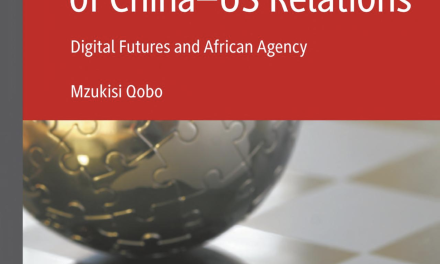This issue of Africa in Fact is part of a broader initiative aimed at shedding light on the competition between the US and China in the African digital sphere. The project focuses on the competition between the US and China in Africa’s digital sphere while providing African responses to such competition. Within the broad framework of Africa-US-China digital engagements, contributors to this issue discuss some of the pertinent issues from an African perspective.
This initiative responds to China’s rise in the global sphere, its implications for the US, which has remained the sole superpower for nearly three decades and, significantly, what this means for Africa. In particular, the initiative focuses on the unfolding competition between China and the US for a share in Africa’s information and communication technology (ICT) sector, a development that has come into sharp focus in recent months. However, while the competition in Africa is evident in African media and in the statements issued by US and Chinese leaders and officials, there hasn’t been a concomitant body of knowledge that would shed light on this phenomenon from an African standpoint. The articles in this issue begin to redress these gaps by undertaking an analysis of old and new issues in the digital sphere across the five regions of the continent – southern, eastern, central, western, and northern.
The competition has resulted in a lack of clear global leadership and governance of emerging digital technologies, as China and the US battle over critical issues of ICT deployment and use. This has, in turn, resulted in digital technology being one of the major domains of geopolitical friction between the powers, with extensive consequences for Africa.
Analysts have pointed out that US-China digital competition has taken the form of a global “tech war”, with differing opinions and perspectives from either side. The more tangible and visible aspects of the tech war are seen in trade disputes underlined by mutual imposition of sanctions, penalties, fines, and the blockage of the operations of tech companies on either side. Authors such as Wits University’s Iginio Gagliardone and the University of Denver’s Suisheng Zhao see the competition as a struggle between democracy and autocracy with the US as the normative leader on one side and China the leader on the other. This has introduced the narrative of what authors refer to as “Geotech” – the link between geopolitics and technology – in which there is an ostensible strive for a balance of power globally. Some have gone as far as concluding that the digital competition has morphed into a putative Cold War.
Against the background of global digital competition between the two powers, perspectives on their implications for Africa have emerged. In other words, the tech war between the US and China has spilled over onto the African continent. Commentators agree that the tech war in Africa is a continuation of the competition that has intensified since 2009 when China overtook the US to become the continent’s leading trading partner. On the one hand is the view that China is helping African countries establish internet or information societies by financing projects and offering affordable ICTs, while the US specifically and the West generally are often seen as less supportive in these respects. This constitutes a positive or techno-optimistic narrative for China, emphasising economic benefits for Africa and propounding an African dimension of China’s Digital Silk Road. On the other hand is the view that China is exporting its “authoritarian version” of ICTs, particularly the internet, and that the US specifically and the West broadly should work with African counterparts to stem emerging illiberal governance practices.
The upshot is that the question of the impact of Chinese and US ICT investments and engagements in Africa is a contested and far from settled matter. Since Africa is literally in the middle of the US and China tech war, the region faces dicey technological choices between the offerings of the two powers. Africa is considered a large and emerging ICT market for US and Chinese products and services because of the continent’s low level of ICT penetration. Both the US and China see the digital divide in Africa as an opportunity to structure deals that not only benefit their companies, but also constitute a new area of influence.
As China and the US battle for a share of Africa’s ICT sector, it is important for Africans to muster agency and define and shape the nature of the engagements. Intellectuals interested in what is being referred to as “techno-politics” ought to step up to the plate to generate the knowledge and perspectives that will inform policy and contribute ideas to be used by African ICT businesses. In this issue, such an agenda begins to take shape, with African intellectuals drawing on debates and empirical data to offer perspectives on how Africa should respond to the practices of the two internet powers. This issue not only provides knowledge and information on the patterns and trends that China and the US are deploying toward Africa, but also offers thoughts on the conceptual, theoretical, and methodological approaches for understanding what is at play.
The significance of this issue is manifold. First, while the tech war can be analysed and studied from an entirely US-China competition prism, this would fall short of African interests. Thus, one of the areas of focus by contributors to this issue is a consideration of the impact of the tech war in the African ICT sector. Appreciating the diversity of a 55-nation continent, the issue includes perspectives on a cross-continental scale, ensuring similarities and differences in the western, central, southern, eastern, and northern regions are captured. A pertinent question is, “What are the impacts of the competition of the US and Chinese state and non-state actors in selected countries in these regions?”
Second, it is evident that Africa is being courted by the US and China to take sides in their evolving and dynamic tech-based rivalry. This raises two questions about the strategies that the US and China are directing toward the continent. Which specific technologies and companies have been affected by the counter-imposition of sanctions by the US and China and what does this mean for Africa? Relatedly, do the American and Chinese digital technologies being deployed show more benefits and fewer risks, or vice versa?
Third, and perhaps more importantly, how are African countries responding to the strategies directed towards them by the tech actors from both powers? In other words, from the viewpoint of Africans, which US and Chinese strategies are succeeding, and which are failing? In which ICT sub-sectors is Africa being drawn towards the US or China, and why? What relevant role can Africa play in the global governance of ICTs given the tech battle between the US and China?
In this issue, readers will be drawn to comparisons between US and Chinese ICT strategies and practices in Africa, including the geopolitical superstructure that informs developments. ICT governance issues – including policies, regulations, and legal frameworks – are discussed in the context of calls for internet sovereignty vis-a-vis internet universality. Under the rubric of digital diplomacy, issues around foreign policy motivations by the US and China are discussed, with the aim of appreciating how Africa is being wooed and persuaded in two differing directions.
Some of the contributors specially discuss the sub-sectors in which the US and Chinese visions are on a collision path. These include those relating to 5G technologies, surveillance, e-commerce, financial technology (e.g., digital currencies), telecommunication infrastructure, digital gadgets, artificial intelligence (AI), space technology, and social media applications.
We hope readers will enjoy reading this issue, and join the debate on how Africa should be more active in shaping global information societies rather than taking a passive stance.
Dr Bob Wekesa – Guest editor
Dr Bob Wekesa is acting director and research and communications coordinator at the African Centre for the Study of the United States based at the University of the Witwatersrand, South Africa. He holds a Bachelor’s degree from the University of Nairobi and Master’s and doctoral degrees from the Communication University of China, Beijing. His area of teaching, research and public engagement is the intersection of journalism, media, and communications on the one hand and geopolitics, diplomacy and foreign policy on the other. He supervises post-graduate projects in these fields. His current research work includes international communication; diplomacy with a focus digital and public diplomacy; African diaspora; the internationalisation of African cities; the geopolitics of Africa and established and emerging powers. Prof Wekesa is well published in academic and popular platforms.












